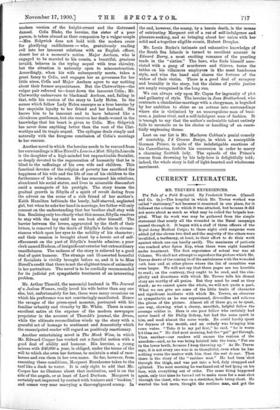CURRENT LITERATURE.
MR. TREVES'S EXPERIENCES.
The Tale of a Field Hospital. By Frederick Troves. (Cassell and Co. 6s.)—The hospital in which Mr. Treves worked was called " stationary," not because it remained in one place, for it followed the column to which it was attached, but because it did not move about as much as what may be called the brigade hos- pital. What its work was may be gathered from the simple statement that nearly all the wounded in the Natal campaign passed through it. It began with a staff of three officers of the Royal Army Medical Corps; to these eight civil surgeons were added (of the eleven two died and the majority of the others were invalided, a testimony, at least, to their effort to do their work against which one can hardly cavil). The maximum of patients was reached after Spion Kop, when there were eight hundred under treatment. The first experience of actual war was at Coleus°. We shall not attempt to reproduce the picture which Mr. Treves draws of the coming in of the ambulances with the wounded teth here and at other places where the list of casualties was even larger. We will not say that these pages are too horrible to read; on the contrary, they ought to be read, and the sim- plicity and directness with which Mr. Treves tells his dismal story are worthy of all praise. But they must be read as they stand ; as we cannot quote the whole, we will not quote a part. What we can give are some of the little traits of character and significant incidents with which Mr. Treves, an observer as sympathetic as he was experienced, diversifies and relieves the gloom of the picture. Almost all of these go, so to speak, one way, showing what a cheery, unselfish, helpful fellow the average soldier is. Here is one poor fellow who certainly had never heaid of Sir Philip Sidney, but had the same spirit in him, and used almost the same words. He could hardly speak for dryness of the mouth, and an orderly was bringing him some water. "Take it to my pal first," he said, " he is worse hit than me." He died next morning, but the "pal" got through. Then another—our readers will excuse the realism of the anecdote—said, as he was being hoisted into the train, " Pat me in the lower berth, because I keep throwing up." As Mr. Troves says, it is not every one wao is so thoughtful, even when he has nothing worse the matter with him than the ma/ de mer. Then there is the story of the "restless man." He bad been 'shot through the thigh, and was put into a bed, duly strapped and splinted. The next morning he was found out of bed lying on his face, with everything out of order. The same thing happened again, only this time he tercel out to make room for a man shot through the chest, who was on a stretcher, beds being short. He wanted the bed more, thought the restless man, and got the
orderlies to make the change. The newcomer died and the R.M. was put back. Twice again he did the same thing, till at last he had to be seriously talked to and put under an absolute prohibi- tion. But he had the last word. " You see, doctor, I am such a restless man." Then there was Private Goodman, of the King's Royal Rifles. We will not give the details of his hideous wound. Let it suffice to say that his mouth was shot away. Mr. Treves gives the notes the speechless man made in his memorandum book. The last is " Did my haversack come with me ? If it did there is some tobacco in it, you can give it to them that smoke" (smoking is the panacea of sound and sick). We are glad to know that Goodman is well and as cheery as ever. We are told, too, about the dying. One officer was sinking into unconscious- ness, but the boom of the 4/ gun firing from the hill above roused him for a moment. Every time he smiled and said " They are getting it now." They were his last words. He was happy in his ignorance, for things were not going as he thought. Very likely it was his first battle, but we are reminded of the groat soldier who had seen fights without number and seemed to be watching one as he murmured " Tete de Tarmee." Few, we should say, can read this book with dry eyes, but every one should read it.























































 Previous page
Previous page